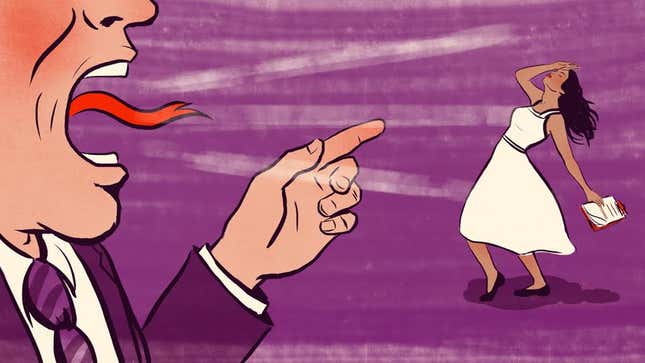Your Nightmare Boss Could Be Making You Sick
Latest

No one needs to tell you that having a mean boss sucks, but studies examining the impact of uncivil workplaces on your stress levels and immune system are a decent reminder of what it really means for you when there’s a dick in charge. A few possibilities: Ulcers, cardiovascular problems, diabetes, and cancer, all of which look incredible on a resume.
In a roundup at the NYT of some of those studies, covering 20 years of research, Christine Porath—who says most people are treated rudely at work about once a week—sums it up succinctly: “How we treat one another at work matters. Insensitive interactions have a way of whittling away at people’s health, performance and souls.”
This is, again, not news to anyone who has ever held down a job, or understood on a cellular level the difference between showing up at a workplace where you feel liked, valued and appreciated and showing up at an office where it’s all you can do to endure the raging, terrible, toxic monsters you call your coworkers and/or boss. And yet, we must bear witness to every last sling and arrow to understand exactly what, in these bad cases, is being lost.
In one cited study from 2012 that followed women through stressful jobs for a decade, researchers found a 38 percent increase in the risk of a “cardiovascular event,” which I am fairly certain does not mean a party for your heart. As for what, exactly, makes a job stressful, Porath notes there are a thousand cuts by which to experience this particularly defeating death:
Bosses produce demoralized employees through a string of actions: walking away from a conversation because they lose interest; answering calls in the middle of meetings without leaving the room; openly mocking people by pointing out their flaws or personality quirks in front of others; reminding their subordinates of their “role” in the organization and “title”; taking credit for wins, but pointing the finger at others when problems arise. Employees who are harmed by this behavior, instead of sharing ideas or asking for help, hold back.
Porath looked into why people are such jerks at work by interviewing hundreds of people in 17 industries. There are all kinds of possibilities at play, such as the fear of being taken advantage of if you’re too nice (supported by the notion that being a jerk pays off, depending on the circumstances). In her survey of those industries, she found that more than half said they were just too “overloaded” to not act like literal jackals, and over 40 percent told her they “did not have time to be nice.”
But, you can just file that under Things Dicks Say. As Porath correctly notes, nice is not time-consuming. It’s all about the execution. A nice person is not trying any harder than a dick, they are just a different sort of person—one that gains power and acts more, not less humane.
In the defense of the Workplace Dick, though, workplaces by design don’t exactly foster niceness. We all approach our jobs knowing we’re supposed to leave our personal problems at the door; in the interest of productivity, we put a worker face that’s occasionally less than human. While this makes all sorts of sense for getting down to business, it also means that the work self that remains is inherently, deliberately less tolerant of human problems, whether it’s someone latest breakup, so-and-so’s divorce, what’s-her-name’s ailing pet, etc.
Add to this the prevailing economic attitude that we are all supposed to be so grateful to have jobs at all as well as the fact that most of us still work in hierarchical cultures, and you end up with a situation in which the so-called “ideal worker”—one aspiring in good faith for Teflon-like immunity to the jibes and stings of working life—is also a prime victim over which a shitty boss may run roughshod at will.
Let’s admit that, in most cases, that’s simply the cost of being a worker today. And in all cases, being a grownup means dealing with shitty people. So get your game face on because you gotta stack paper, right? But what this article talks about is the real, measurable cost in the loss of workplace focus, which in certain industries translates into literal lives lost. Porath writes:
-

-

-

-

-

-

-

-

-

-

-

-

-

-

-

-

-

-

-

-

-

-

-

-

-

-

-

-

-

-

-

-

-

-

-

-

-

-

-

-








































